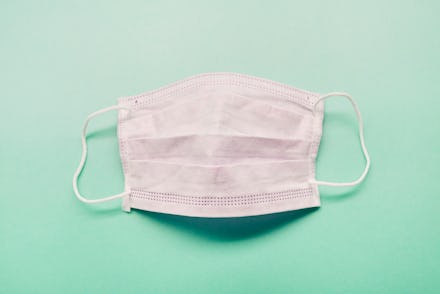Why are we suddenly rethinking masks?

To mask up, or not to mask up? Until recently, the answer from the Centers for Disease Control and Prevention, the World Health Organization, and public health experts to the general public was no, unless they have COVID-19 symptoms or are taking care of someone who does, and to save them for health workers, The Atlantic reports. Evidence of whether masks can curb transmission has remained inconclusive, as multiple outlets have pointed out. But now, the White House might be poised to begin advising that Americans wear masks after all, CNN reports, and the CDC is reviewing its guidance on them, per the Times. Why are we rethinking masks?
Besides this reconsideration among the White House and CDC, news articles and op-eds advocating broad use of masks in the West have further fueled the debate, The Atlantic notes. So, too, have online tutorials on how to make your own.
Yet none of this changes the murkiness of the data on the effectiveness of face masks in pumping the breaks on transmission. The majority of studies on the subject have major limitations, namely small sample sizes or confounding variables that make it tricky to pinpoint the factors responsible for their findings, per Quartz. Meanwhile, The Atlantic reports that although studies have shown that face masks could curb the spread of flu in homes, as well as SARS, others have documented little to no benefit, or only when paired with other precautions like washing your hands.
And the argument that countries where most citizens wear masks succeeded in stemming the tide of COVID-19 spread isn't actually that cut-and-dried. Meanwhile, health workers on the front lines of the pandemic are grappling with shortages of protective gear, with reports of them reusing masks and even crafting their own, per ProPublica.
Yet none of this changes the murkiness of the data on the effectiveness of face masks in pumping the breaks on transmission.
So if data on the effectiveness of masks in reining in the spread of disease is still inconclusive, and health workers still face a shortage of them, what’s changed?
Fear is on the rise, for starters. The US now has the most reported cases of any country, with more than 205,000 cases nationwide as of Wednesday afternoon, per the Times. Compare that to only about 100 confirmed cases on March 1, as reported by CNBC. The increase in the number of states issuing stay-at-home orders, like the shifting debate about masks, reflects our growing collective concern.
And data has surfaced showing that infected yet asymptomatic people are transmitting the novel coronavirus at high rates, the Times reports. Robert Redfield, the director of the CDC, cited this data told WABE in Atlanta, an NPR member station, that the agency was reviewing its guidelines “to see if there’s potential additional value for individuals that are infected or individuals that may be asymptomatically infected.” He added that some infected people may end up spreading the virus for as long as 48 hours before feeling sick. In other words, wearing a mask, even if you don’t feel sick, could prevent you from transmitting the virus if you happen to be infected but don’t experience symptoms, or haven’t experienced them yet.
Psychological arguments in support of widespread mask use have also emerged. Some experts point out that masks could foster a false sense of security and lead people to neglect social distancing and other measures, per the Washington Post. Yet The Atlantic explains that in Asia, masks serve as symbols of civic duty. We could take a cue from Asia and use them to convey that we’re taking the pandemic seriously. And a New Yorker account of the coronavirus lockdown in Chengdu, China, noted that masks facilitated social distancing by helping people “turn inward” and making them more likely to ignore each other.
Anthony Fauci, the director of the National Institute of Allergy and Infectious Diseases, said he’d "lean toward" advising regular citizens to wear masks, so long as it doesn’t compromise their availability to health workers, per CNN; some experts say masks made from non-medical fabric could help. And despite the inconsistent findings on whether masks can slow transmission, "something doesn't have to be 100% effective to be beneficial," Fauci told the network’s Sanjay Gupta on a Wednesday recording of "Coronavirus: Fact vs. Fiction podcast."
The reality remains the same: Research on the effectiveness of masks in curbing disease transmission is inconclusive, and health workers really, really need them. What's changed is our response to this reality amid not only what The Atlantic points out is a fast-shifting pandemic, but our fast-shifting understanding of it.